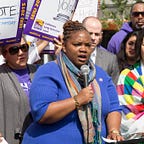Our vote is our power.
Dr. Martin Luther King Jr.’s legacy inspires our fight for economic justice and equity. The March on Washington, where Dr. King gave his famous “I have a Dream” speech, was titled the “March on Washington for Jobs and Freedom” — economic justice and jobs were central to his message and life’s work.
Today, we are reminded that there can be no racial justice without economic justice, there can be no economic justice without the passage of transformative legislation, and there can be no transformative legislation unless we are able to access the polls and elect legislators who carry our values. The voices and votes of Black and brown communities are under attack from the barrage of voting restrictions that disproportionately impact people of color and make it harder for us to vote. In 2021, 34 laws were passed and more than 440 bills were introduced that restricted access to voting across the country.
Congress must take bold action now and pass the Freedom to Vote Act and the John Lewis Voting Rights Advancement Act. The Freedom To Vote Act will make voting easier and ensure that elected officials are held accountable by the voters that put them in office. The John Lewis Voting Rights Advancement Act would reinstate protections from the Voting Rights Act that were stripped away by the Supreme Court in 2013 — namely, the John Lewis Act would require states to get clearance from the Department of Justice before changing voting systems. This would protect voters from racist voter restrictions, including racial gerrymandering. Without the Freedom to Vote Act and John Lewis Voting Rights Advancement Act, many voters will face unprecedented obstacles in 2022. If Congress does not act, we will be turning the country backward.
It’s time for America to move forward towards racial and economic justice, not backward. As California’s largest union and the nation’s largest long-term care union representing 400,000 home care and nursing home workers throughout California, SEIU Local 2015 represents caregivers who have been historically overlooked in an industry shaped by racist and sexist policies. The home care industry is 86% women, with more than half identifying as Black, Latina, and Asian women. The median income for these women is less than $19,000 and benefits are sparse, if available at all. Home care workers are paid poverty wages and commonly lack health benefits, paid sick days, hazard pay, or training opportunities.
Investment in long-term care workers is a matter of racial justice. We need to recognize caregivers for the skilled, dedicated, compassionate, and essential healthcare workers they are in the way we respect, protect, and pay them. We must recognize not only the essential, but the valuable nature of these jobs, and that the people doing them — largely women of color — are fundamental members of our society. We call for an immediate investment to improve the working conditions of these essential workers, specifically demanding a $20 an hour wage floor in order to get these workers on a path to the middle class. The “Time for $20” is now. SEIU Local 2015 is committed to fighting for voting rights, economic justice, and an equitable workforce and we won’t stop until our members have the opportunity to thrive and be heard in our multiracial democracy.
